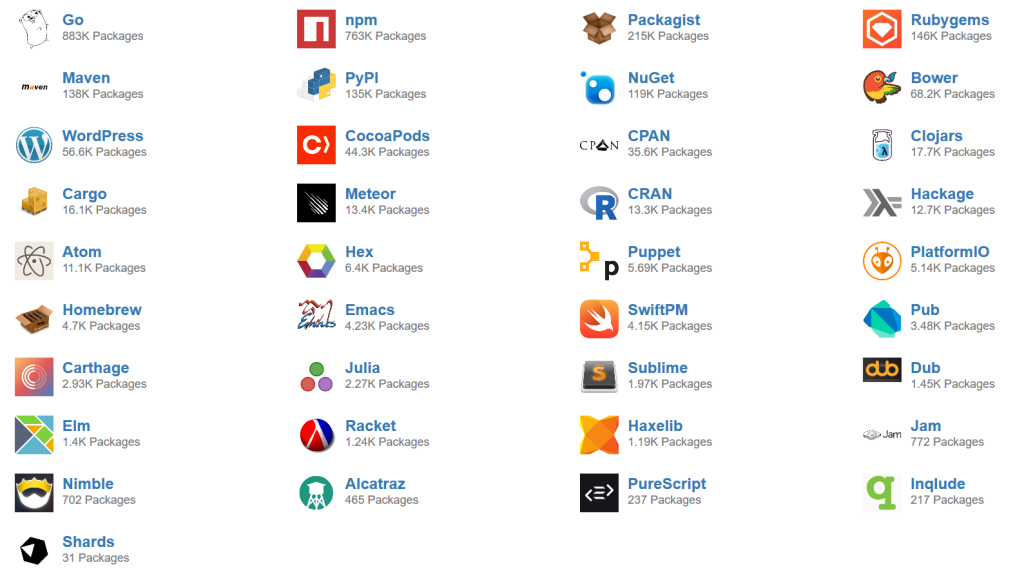
In the ever-evolving world of software development, package management tools play a crucial role in streamlining dependencies, ensuring reproducibility, and simplifying development workflows. As we venture into 2024, here’s a glimpse into the top contenders, keeping in mind some key trends:
Security Focus:
- Enhanced vulnerability scanning: Tools are integrating advanced security features to detect and mitigate vulnerabilities within packages, promoting secure software development practices.
- Software Bill of Materials (SBOM) generation: Generating detailed SBOM reports is becoming increasingly important for transparency and compliance requirements.
Cloud-native Integration:
- Seamless integration with cloud environments: Tools cater to modern development workflows by providing smooth interaction with popular cloud platforms like AWS, Azure, and GCP.
- Support for containerized deployments: Efficient management of packages within containerized environments is essential for microservices architectures.
Language-specific Expertise:
- Specialized tools for popular languages: Dedicated package managers offer deeper insights and finer control over specific language ecosystems.
- Integration with development environments: Tight integration with IDEs and build systems streamlines dependency management tasks.
Advanced Features:
- Version resolution and conflict management: Efficient handling of dependencies and version conflicts is crucial for complex projects.
- Offline package management: The ability to manage packages without an internet connection is valuable for distributed teams or restricted environments.
- Community-driven ecosystems: Large and active communities contribute to the growth, innovation, and support of package management tools.
Here are some top choices across various categories:
All-round Excellence:
- npm (JavaScript): The dominant force in the JavaScript ecosystem, offering a vast registry and extensive features.
- NuGet (C#): Widely used for .NET development, providing a secure and reliable package management experience.
- PyPI (Python): The official repository for Python packages, boasting a massive collection and community support.
Open-source Champions:
- APT (Debian/Ubuntu): The default package manager for Debian-based systems, offering stability and a large repository.
- Yum (Red Hat/CentOS): The primary package manager for Red Hat and CentOS systems, known for its reliability and ease of use.
- Homebrew (macOS): A popular package manager for macOS, simplifying installation and management of various software packages.
Cloud-native Solutions:
- AWS CodeArtifact: A managed package repository service in AWS, offering secure storage, sharing, and versioning of packages.
- Azure Artifacts: Integrated within Azure DevOps, providing package management capabilities for various development scenarios.
- Google Cloud Artifact Registry: Stores and manages packages for Google Cloud Platform projects, ensuring secure and scalable access.
Language-specific Powerhouses:
- Cargo (Rust): The official package manager for Rust, known for its speed, security, and integration with the Rust compiler.
- Go Modules: The built-in package management system for Go, offering simplicity and efficiency for Go projects.
- Composer (PHP): A dependency manager for PHP projects, promoting project organization and dependency management.
Selecting the best package management tool depends on your specific needs and preferences. Consider factors like:
- Programming languages used: Choose a tool that supports your primary languages.
- Project size and complexity: Larger projects might require more advanced features.
- Security requirements: Prioritize tools with robust security features and SBOM generation capabilities.
- Cloud environment: Consider tools that integrate seamlessly with your chosen cloud platform.
- Development workflow and preferences: Opt for a tool that integrates well with your IDE and build system.
By carefully evaluating your requirements and comparing the strengths of different tools, you can make an informed decision and leverage the power of package management to streamline your development process and ensure reproducible builds.
- PPG Industries: Selection and Interview process, Questions/Answers - April 3, 2024
- Fiserv: Selection and Interview process, Questions/Answers - April 3, 2024
- Estee Lauder: Selection and Interview process, Questions/Answers - April 3, 2024

